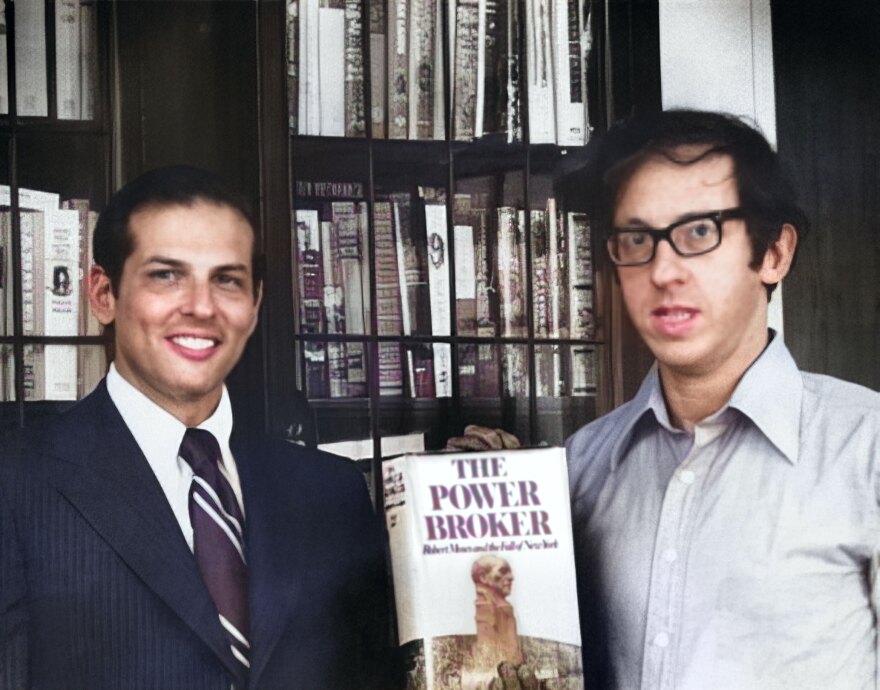Over five decades of writing and editing, legendary biographer Robert Caro and prolific editor Robert Gottlieb have collaborated (and quarreled over punctuation) to produce works recommended by presidents, praised by publishers and beloved by generations of political and literary readers.
Their professional relationship—sometimes feuding, often quirky but always productive—is the subject of the film “Turn Every Page: The Adventures of Robert Caro and Robert Gottlieb” that plays Friday at 2 p.m. at the Isis Theatre for Aspen Film’s annual Academy Screenings festival.
Robert Gottlieb’s daughter, Lizzie Gottlieb, directed the film and recognizes that her subjects may be up against a ticking clock.
Caro is 87, his editor is 91, and Caro still hasn’t finished the fifth volume in what was supposed to be a three-volume chronicle of one man’s rise to presidential power in “The Years of Lyndon Johnson.”
“Here are these two guys, kind of in a race against time, really a tortoise-like race against time to finish their life's work,” Lizzie Gottlieb said in a Zoom interview with Aspen Public Radio last week. “I thought, there's so much at stake for them, as they hope to finish, and for the readers of these books, who want the story to be finished. And also for me, … my dad is 91, and I kind of cherish every minute I have with him.”
But Caro isn’t one to rush a book to the printing press. It took him seven years to research and write his Pulitzer Prize-winning debut “The Power Broker,” a hulking 1974 biography of New York urban planner and public official Robert Moses. He published the first President Johnson biography, “The Path to Power,” in 1982, releasing subsequent volumes about once a decade until2012, but he still does not have an ETA on the fifth volume.
(Robert Gottlieb, for the record, works at unrivaled speed: He has edited between 600 and 700 books, including works by Toni Morrison, Nora Ephron, Ray Bradbury and Bill Clinton.)
“Turn Every Page” documents some of the badgering Caro must endure about the status of that last LBJ biography, but also shows that it comes from a place of love and enthusiasm in his fans.
The documentary is packed with testimonials from literary types and political figures who adore Caro’s work and the impact of his books, which consider the powerless as well as the powerful in their hefty volumes. One publisher is so enamored by his work that she admits she has not yet finished his latest book, for fear of a world in which she doesn’t have any more Caro to read.
“You feel a powerful connection to the man who devoted himself for so many decades to finding out the secrets of how power works, and revealing them to us,” Lizzie Gottlieb said. “And I think you feel like you're part of some secret society of people who get it, people who understand, so you feel a kind of gratitude to him for opening your mind to how our world works.”
She said the documentary considers some of the questions Caro has dissected in his books about political power.
“How does power work in America? How does one pursue truth and true understanding of history and of power?” Gottlieb said.
The film also explores the purpose and value of asking and answering those questions.
“In the age of Twitter, and social media, how do you make something that really endures and is meaningful?” Gottlieb said.
But “Turn Every Page” is hardly a heavy film.
Gottlieb said she wanted it to feel like a “buddy movie,” and it does, as the two Roberts trade praise and clever jabs toward one another in separate interviews.
Caro only agreed to participate if he didn’t have to appear in the same room as his editor, because he warned it could get “contentious,” according to Gottlieb. She found it “hilarious, and adorable, and a little maddening, and a kind of irresistible challenge as a filmmaker.”
Her father, too, took some convincing. Robert Gottlieb initially refused to participate, but his daughter’s determination ultimately cajoled him.
Eventually, the film crew even got the two of them in a room together, rewarding viewers with the rare treat of Caro and Gottlieb sharing the screen.
Their search for a pencil, in a brief scene toward the end of the film, feels like a silly, delightful romp with two quibbling friends. The moment is sobered up only a little by a mics-off editing session where, presumably, arguments about semicolons resume in the writer and editor’s stubborn pursuit of greatness.
“The biggest thing at the heart, I think, is watching these two men and their total joy in their work, their industriousness, their adorableness,” Lizzie Gottlieb said. “I hope that it's mostly inspiring for all of us who try to create things, to watch their dedication and … their joy in creating what they do and their joy in work.”
She also assures that the film didn’t distract Caro from inching toward the finish line on that long-awaited latest book, either.
“My producer, Jen Small, says that I should put a disclaimer on the poster,” she joked. “No Lyndon Johnson books were harmed in the making of this film.”




